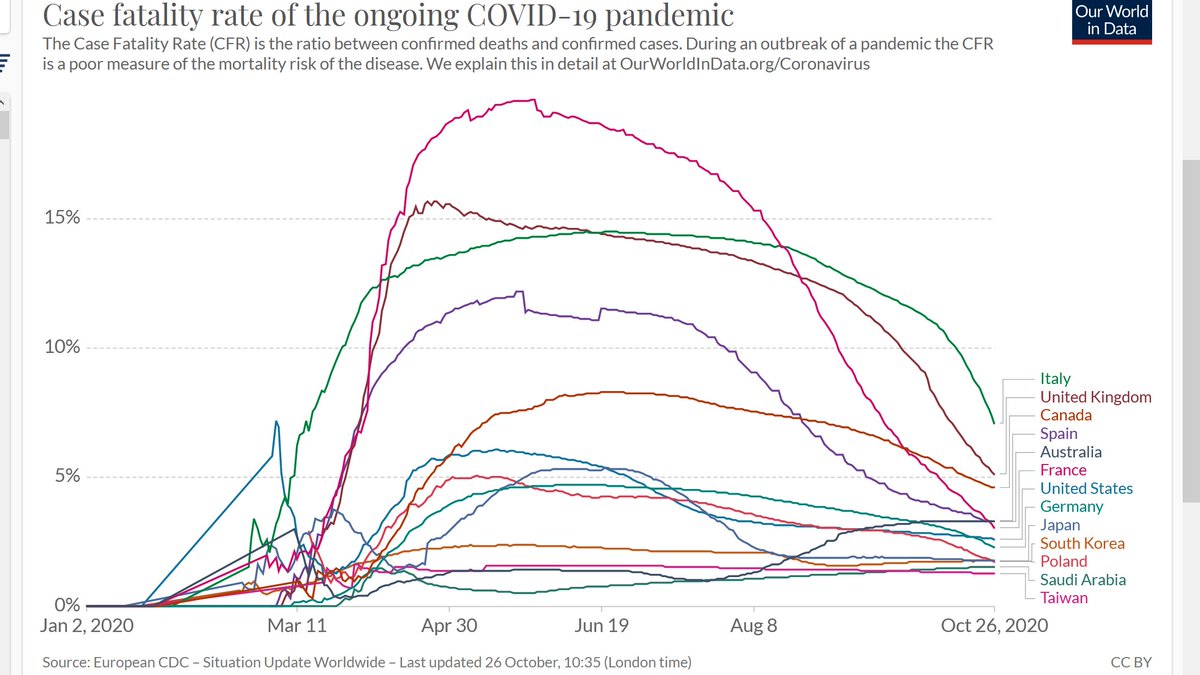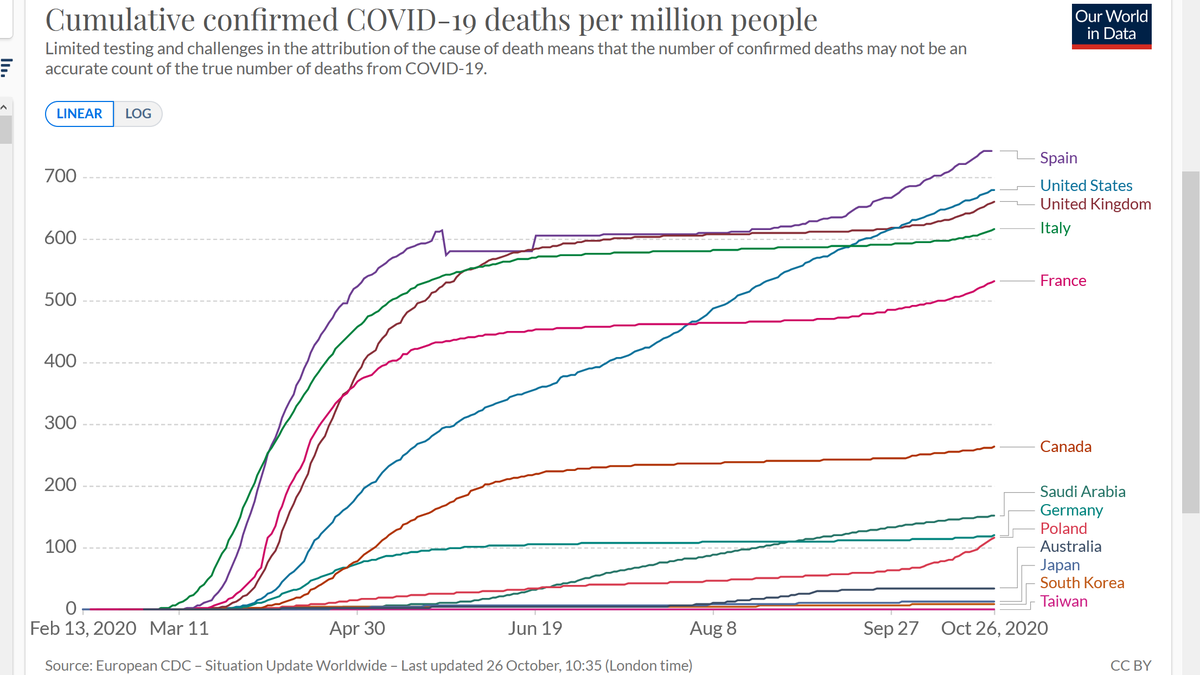
Important preprint: @LauraCRosella and colleagues.
Estimating excess mortality in #Ontario during #COVID19 first wave using cremation data
Some observations summarized in thread.
medrxiv.org/content/10.110…
Estimating excess mortality in #Ontario during #COVID19 first wave using cremation data
Some observations summarized in thread.
medrxiv.org/content/10.110…
Cremation numbers in #Ontario at peak of #COVID19 1st wave vs 2017-2019:
⬆️>30% deaths all ages
⬆️38% deaths in >75 age grp
⬆️89% deaths in longterm care homes
⬆️68% deaths at home
No significant change: hospitals deaths
⬆️>30% deaths all ages
⬆️38% deaths in >75 age grp
⬆️89% deaths in longterm care homes
⬆️68% deaths at home
No significant change: hospitals deaths
Study monitors cremations as death indicator.
In ON ~70% of deaths cremated. No change in this rate from 2017-2019 to 2020.
So, increased cremations not due to increased cremation "popularity". Instead, likely related to excess mortality directly & indirectly due to #COVID19.
In ON ~70% of deaths cremated. No change in this rate from 2017-2019 to 2020.
So, increased cremations not due to increased cremation "popularity". Instead, likely related to excess mortality directly & indirectly due to #COVID19.
ht @DFisman for drawing attention to preprint
Remember folks, this is a preprint. It has not yet been peer-reviewed by experts who can evaluate the models, data collection etc. But work from @LauraCRosella and colleagues is typically rigorous.
Also, while you're here, please take a look at (now) daily thread trying to draw attention of #Canadians to our #COVID19 deaths in residential care settings.
Will be trying to track & communicate this through 2nd wave.
Will be trying to track & communicate this through 2nd wave.
https://twitter.com/MoriartyLab/status/1321486552141336579?s=20
Something very interesting:
From Jan-Jun #Ontario cremations increased 12.6% vs 2017-2019 (estimated all cause mortality increase).
There were 4436 excess cremations, which is 12.4% of confirmed #COVID19 cases during that period (35,738).
Hmm.
From Jan-Jun #Ontario cremations increased 12.6% vs 2017-2019 (estimated all cause mortality increase).
There were 4436 excess cremations, which is 12.4% of confirmed #COVID19 cases during that period (35,738).
Hmm.
Other interesting observations:
Increase in cremation/estimated all causes mortality for indicated age groups Jan-Jun in #Ontario:
0-44 yrs: 24.5% (troubling? weird? #COVID19-independent?)
45-74 yrs: 10.6%
75+ years: 13%
hmm....
Increase in cremation/estimated all causes mortality for indicated age groups Jan-Jun in #Ontario:
0-44 yrs: 24.5% (troubling? weird? #COVID19-independent?)
45-74 yrs: 10.6%
75+ years: 13%
hmm....
An estimated excess mortality of 12.6% in #Ontario during #COVID19 first wave puts us in same range as excess mortality rates for France, Israel, Netherlands, Portugal and Switzerland, and is double the excess mortality in Germany, Austria, Denmark, Norway.
Based on the #Ontario weekly epidemiologic summary of July 4, there were 35,908 confirmed #COVID19 cases and 2700 deaths.
This means the estimated COVID-19 case fatality rate in ON for that period was 7.5%, which is VERY high.
files.ontario.ca/moh-covid-19-w…
This means the estimated COVID-19 case fatality rate in ON for that period was 7.5%, which is VERY high.
files.ontario.ca/moh-covid-19-w…
Ontario's current cumulative estimated CFR is 4.3%, which is still high, but reflects that we started catching more of the less severe cases as testing rates & target populations changed.
Sorry. Forgot to add the link to the FT excess mortality data viz page for comparison of Ontario to other regions:
ft.com/content/a2901c…
ft.com/content/a2901c…
Ontario's CFR could also be coming down because we're doing a better job of "protecting" residential care settings, improved treatment etc. We'll need to watch this closely b/c there's not much public evidence that we've done much at all to improve outcomes in residential care.
Ontario's CFR could also be coming down because we're doing a better job of "protecting" residential care settings, improved treatment etc. We'll need to watch this closely b/c there's not much public evidence that we've done much at all to improve outcomes in residential care.
Back of the envelope calculations:
1. ~70% of ppl who die in ON are cremated
2. 4436 excess cremations Jan-Jun
3. X1.3: ~5770 excess deaths
4. Seroprevalence at end June ~1.1%
5. Pop ON 14.57M (1.1% = 160K cases)
6. 5770/160K=3.6% case fatality ratio
publichealthontario.ca/-/media/docume…
1. ~70% of ppl who die in ON are cremated
2. 4436 excess cremations Jan-Jun
3. X1.3: ~5770 excess deaths
4. Seroprevalence at end June ~1.1%
5. Pop ON 14.57M (1.1% = 160K cases)
6. 5770/160K=3.6% case fatality ratio
publichealthontario.ca/-/media/docume…
This is actually very close to the current average cumulative CFR in our peer countries (high income, pop >20M).
Avg CFR for these countries, including #Canada is 3.2%.
Canada cumulative CFR today is 4.5% (3rd highest of all our peer countries, eclipsed only by Italy, UK).
Avg CFR for these countries, including #Canada is 3.2%.
Canada cumulative CFR today is 4.5% (3rd highest of all our peer countries, eclipsed only by Italy, UK).
So, maybe from Jan-Jun we missed 4400 #COVID19 deaths in #Ontario and missed 124,000 cases.
Or we really did do an absolutely horrible job of preventing deaths in residential care setting, producing one of the highest national case fatality rates in the world.
Or we really did do an absolutely horrible job of preventing deaths in residential care setting, producing one of the highest national case fatality rates in the world.
I've been inclined to think that a massive part of the problem lay with the residential care homes (e.g. LTC), given what we all know about them from media, personal experience etc.
HOWEVER, something about this excess cremation numbers study gives me pause.
HOWEVER, something about this excess cremation numbers study gives me pause.
The study by @LauraCRosella et al found that excess cremations linked to deaths in longterm care homes in #Ontario increased 89% from Jan-Jun, but excess cremations linked to deaths in personal residences (homes) increased by 68%, both compared to the same period in 2017-2019.
I am beginning to think that we missed a LOT of #COVID19 deaths & cases, but that perhaps the deaths in LTC were more likely to be reported/recorded/attributed to COVID-19.
Anyway, lots of moving parts & assumptions.
I'm interested to hear what others think.
Anyway, lots of moving parts & assumptions.
I'm interested to hear what others think.
copying in @AshTuite @AmyGreerKalisz @AntibioticDoc @NishaOttawa @AlainnaJJ @BeateSander @ishaberry2 @janinemccready since we don't hear enough expert input from the gals.
And @DFisman @JPSoucy we'll invite you too. You can be honourary gals for the purpose of this discussion.
And @DFisman @JPSoucy we'll invite you too. You can be honourary gals for the purpose of this discussion.
For good measure, so we hear more from our female experts on this topic, copying in @HotaSusy @BoggildLab @MSemret @AndreaGruneir @AndreaFeller2 @Lauren_J_MacK @docmoser @IDEpiPhD @LapointeShaw @DrKaliBarrett @ProfMajowicz @ShannonTurvey @tara_kiran @NSCrowcroft @vanessagallen
Finally, I want to be absolutely clear that undercounting cases by 3- or 4-fold is well in line w/ estimates from many of our wealthy peer countries. It is the norm for reportable infectious diseases, which are often under-reported by 10-fold.
This isn't about blame--it's about trying to figure out what happened in the first wave, and what we need to be doing right now to prevent more excess deaths. @vanessagallen and many copied in here have done superhuman work already, despite almost impossible odds of success.
And with that, I'm going to go do my "real" job and come back to check in before bed tonight.
• • •
Missing some Tweet in this thread? You can try to
force a refresh












